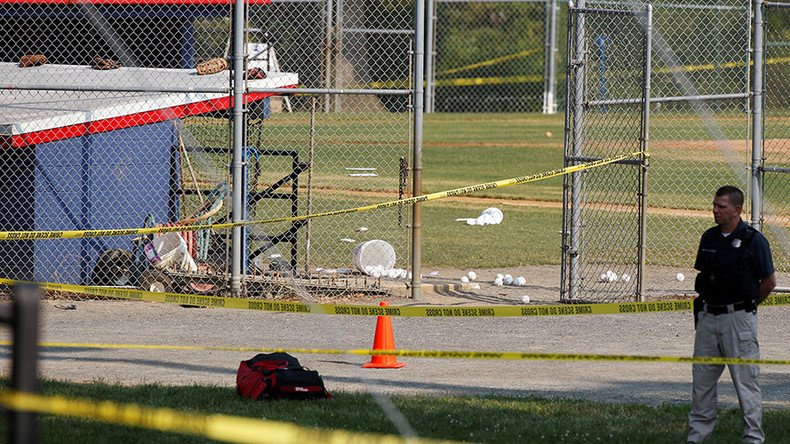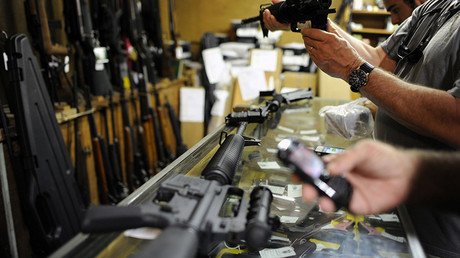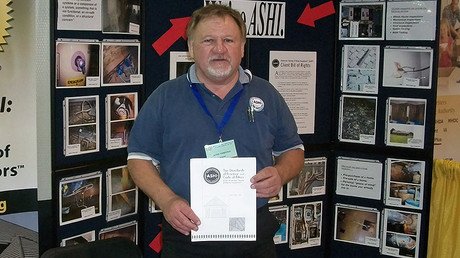GOP baseball gunman committed ‘act of terrorism’ after ‘casing’ park for months – report

The gunman who fired at GOP lawmakers at a baseball field in Alexandria, Virginia, was “fueled by rage against Republican legislators” after the 2016 presidential election and “decided to commit an act of terrorism,” a new report finds.
Bryan Porter, the Commonwealth’s Attorney for the city of Alexandria, found in his investigation that James Hodgkinson, the Illinois man who attacked a group of Republicans at a baseball field, had been “casing” the field for months before the shooting.
Hodgkinson, a 66-year-old unemployed home inspector, picked the location as his target months in advance according to witnesses who reported him walking around the field as early as April.
The report states that Hodgkinson “held strong political opinions and was very unhappy about the outcome of the 2016 presidential election,” and that he spent a “significant amount of time” expressing his political views on social media.
Before leaving his hometown in Illinois, Hodgkinson was also making vague statements about how he would “not be around much longer” to family members, the report said.
Porter contradicts the FBI, who referred to the shooting as an “assault” in a June press release, adding that they did not “believe there is a nexus to terrorism.”
“The evidence in this case establishes beyond a reasonable doubt that the suspect, fueled by rage against Republican legislators, decided to commit an act of terrorism,” Porter wrote.
Terrorism is defined by the Code of Virginia as an act of violence “committed with the intent to (i) intimidate the civilian population at large or (ii) influence the conduct or activities of the government of the United States, a state or locality through intimidation.”
Triggering footage: Gunman opens fire on GOP baseball practiceFull video: https://t.co/iBHacSMqHRpic.twitter.com/GT68IvxVTw
— RT America (@RT_America) June 14, 2017
On June 14, 2017, a team of lawmakers were holding their regular morning practices at the Eugene Simpson Stadium Park when Hodgkinson shot House Majority Whip Steve Scalise (R-Louisiana) and three others.
At 7:02am, Hodgkinson approached two members of the baseball team and asked them whether the practice was for the Democrats or Republicans. When they responded that it was for the Republicans, Hodgkinson responded, “OK, thanks,” and walked to his nearby van.
Hodgkinson then grabbed a fully loaded Century Arms International SKS semiautomatic rifle and a Smith & Wesson 9mm handgun. Hodgkinson, who had never been convicted of a crime, was able to purchase the guns legally in his home state of Illinois.
Concealing the guns, Hodgkinson walked to a gate near third base, which was locked. The report states that the fact the gate was locked “likely saved lives by preventing the suspect from walking onto the baseball field as he fired.”
Standing behind a fence, Hodgkinson fired 33 shots from his position near third-base until he was engaged by Special Agent David Bailey.
The report states that Bailey “helped avert disaster by ‘pinning down’ the suspect and apparently causing him to alter his plans.”
Taking fire, Hodgkinson ran to another position behind home-plate, where he fired another 29 shots at Special Agent Bailey and Special Agent Crystal Griner.
After police arrived, they were able to neutralize Hodgkinson. In total, officers fired at least 40 rounds at Hodgkinson, striking him three times before they rushed to resuscitate him.
The report states that Hodgkinson was firing at the officers so that he could “return to killing and maiming the unarmed people on the baseball field.”
“On these facts, the agents and officers were justified in reasonably fearing for their lives and the lives of the people on the baseball field,” the report states.
Porter found that the officers “prevented innumerable deaths” by using deadly force.
After reviewing dozens of interviews with eyewitnesses and more than 200 items from the crime scene, Porter, who is tasked with reviewing and analyzing any use of deadly force by law enforcement officers that occurs in the City, concluded that the officer’s use of deadly force “was justified by the doctrine of self-defense as that doctrine is outlined by the law of Virginia.”
Under Virginia’s self-defense laws, a person can use deadly force when they perceive an imminent threat of death or serious bodily injury to themselves or a third party.
“Not only were the actions of the agents and officers reasonable, they were obligatory in light of the overwhelming and determined force employed by the suspect,” Porter wrote.














